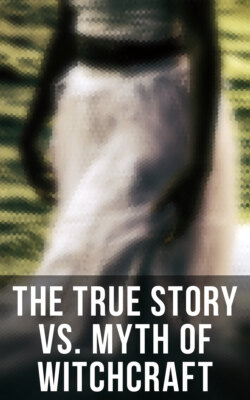Читать книгу The True Story vs. Myth of Witchcraft - William Godwin - Страница 230
На сайте Литреса книга снята с продажи.
FOOTNOTES
Оглавление32. This woman has a place in the records of fashion as introducer of the novelty of yellow-starching the extensive ruffs which were then generally worn. When Lord Chief Justice Coke sentenced her to death (as we shall hereafter see) for her share in the murder of Overbury, he ordered that ‘as she was the person who had brought yellow-starched ruffs into vogue, she should be hanged in that dress, that the same might end in shame and detestation.’ As the hangman was also adorned with yellow ruffs, it is no wonder that Coke’s prediction was amply fulfilled.
33. Arthur Wilson, in his ‘Memoirs,’ furnishes a strange account of the practices in which Lady Essex, Mrs. Turner, and the conjurer took part. ‘The Countess of Essex,’ he says, ‘to strengthen her designs, finds out one of her own stamp, Mrs. Turner, a doctor of physic’s widow, a woman whom prodigality and looseness had brought low; yet her pride would make her fly any pitch, rather than fall into the jaws of Want. These two counsel together how they might stop the current of the Earl’s affection towards his wife, and make a clear passage for the Viscount in his place. To effect which, one Dr. Forman, a reputed conjurer (living at Lambeth) is found out; the women declare to him their grievances; he promises sudden help, and, to amuse them, frames many little pictures of brass and wax—some like the Viscount and Countess, whom he must unite and strengthen, others like the Earl of Essex, whom he must debilitate and weaken; and then with philtrous powders, and such drugs, he works upon their persons. And to practise what effects his arts would produce, Mrs. Turner, that loved Sir Arthur Manwaring (a gentleman then attending the Prince), and willing to keep him to her, gave him some of the powder, which wrought so violently with him, that through a storm of rain and thunder he rode fifteen miles one dark night to her house, scarce knowing where he was till he was there. Such is the devilish and mad rage of lust, heightened with art and fancy.
‘These things, matured and ripened by this juggler Forman, gave them assurance of happy hopes. Her courtly incitements, that drew the Viscount to observe her, she imputed to the operation of those drugs he had tasted; and that harshness and stubborn comportment she expressed to her husband, making him (weary of such entertainments) to absent himself, she thought proceeded from the effects of those unknown potions and powders that were administered to him. So apt is the imagination to take impressions of those things we are willing to believe.
‘The good Earl, finding his wife nurseled in the Court, and seeing no possibility to reduce her to reason till she were estranged from the relish and taste of the delights she sucked in there, made his condition again known to her father. The old man, being troubled with his daughter’s disobedience, embittered her, being near him, with wearisome and continued chidings, to wean her from the sweets she doted upon, and with much ado forced her into the country. But how harsh was the parting, being sent away from the place where she grew and flourished! Yet she left all her engines and imps behind her: the old doctor and his confederate, Mrs. Turner, must be her two supporters. She blazons all her miseries to them at her depart, and moistens the way with her tears. Chartley was an hundred miles from her happiness; and a little time thus lost is her eternity. When she came thither, though in the pleasantest part of the summer, she shut herself up in her chamber, not suffering a beam of light to peep upon her dark thoughts. If she stirred out of her chamber, it was in the dead of the night, when sleep had taken possession of all others but those about her. In this implacable, sad, and discontented humour, she continued some months, always murmuring against, but never giving the least civil respect to, her husband, which the good man suffered patiently, being loth to be the divulger of his own misery; yet, having a manly courage, he would sometimes break into a little passion to see himself slighted and neglected; but having never found better from her, it was the easier to bear with her.’
34. See ‘The State Trials;’ ‘The Carew Letters;’ Spedding, ‘Life and Letters of Lord Bacon;’ Amos, ‘The Grand Oyer of Poisoning;’ and S. R. Gardiner, ‘History of England,’ vol. iv., 1607-1616.
